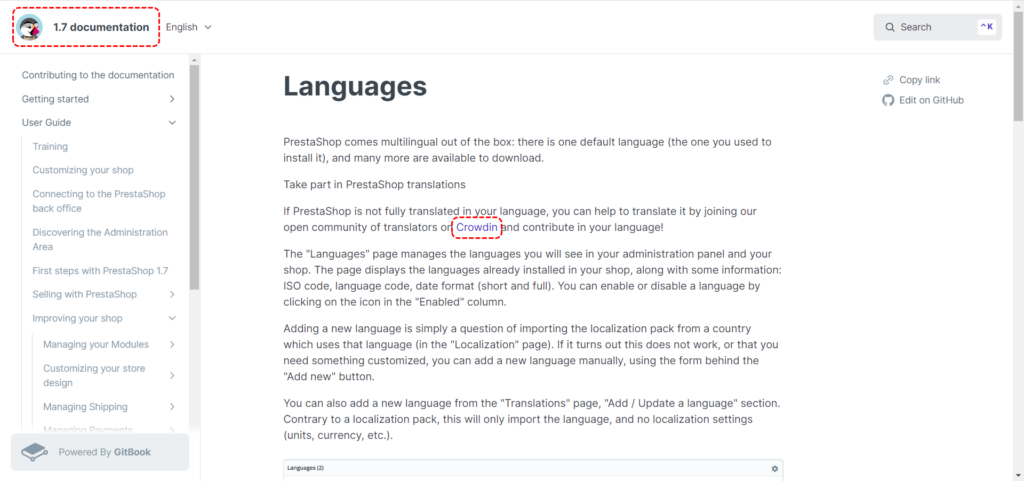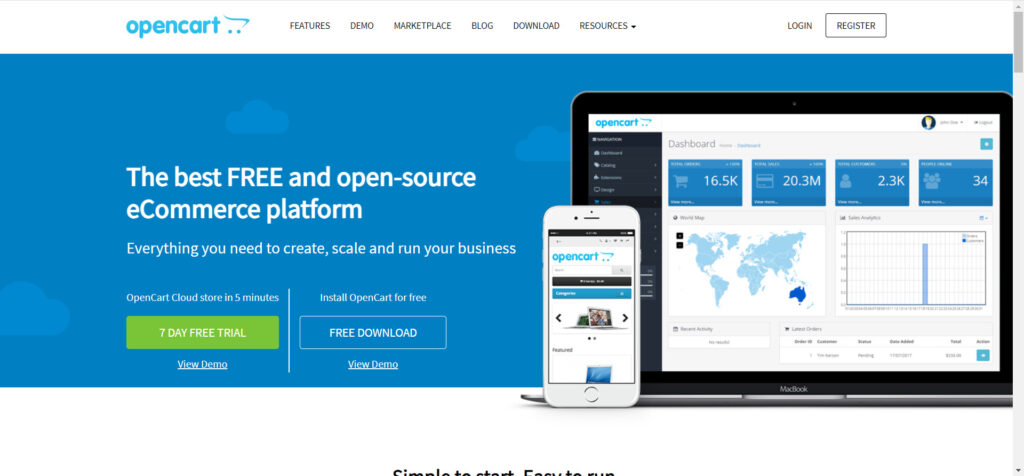Want to switch from WooCommerce to another solution that best suits your specific needs and budget? You’ve come to the right place. In this article, we’ll show you the 6 best WooCommerce alternatives based on 10 years of experience in the eCommerce industry.
Let’s take a quick look at the six WooCommerce alternatives we’re going to cover in today’s list:
- Magento 2
- Shopify
- Big Commerce
- Wix
- PrestaShop
- OpenCart
WooCommerce 101: All you must know about
What is WooCommerce?
WooCommerce is an eCommerce plug-in built exclusively for WordPress websites. The plug-in helps you turn your website into a functional eCommerce web store – where you can list products, accept payments, manage orders, etc.
Thanks to its open-source nature, WooCommerce is highly reputed for its unlimited customization options that only a few platforms can come close to.
How does WooCommerce work?
As we are saying, WooCommerce is a WordPress plug-in. So, you’ll first need to have a WordPress website and then install WooCommerce to enable eCommerce functionalities for your website.
As of writing this article, WooCommerce has powered over 6 million websites, making it one of the most popular eCommerce platforms in the world.

WooCommerce – a robust eCommerce plug-in for WordPress-based sites
However, WooCommerce’s fame doesn’t inherently mean it’s a one-size-fits-all solution. Despite its fantastic customizations, WooCommerce has some cons – which we’ll explore in the next part.
Why are people moving away from WooCommerce?
Are you considering alternatives to WooCommerce? Perhaps you’re already using WooCommerce and finding some of its drawbacks frustrating. Or maybe you’re new to eCommerce and wondering if the disadvantages of WooCommerce are worth the trade-offs.
Let’s take a closer look at the major issues that users often encounter:
Technical skills & coding knowledge required
Compared to hosted solutions like Shopify or Wix, WooCommerce has a steeper learning curve. It’s better suited for users with technical skills who can handle tasks like domain registration and web hosting setup.
Responsibility for security-related tasks
With WooCommerce, you must maintain and update your store. This includes handling security updates and managing any conflicts that may arise.
Slow loading time
WooCommerce websites can experience slower loading times due to various factors such as added plugins, heavy databases, and code complexities. Large image files and extensive content can also contribute to slower performance.
If the cons are unbearable, perhaps you’d love to explore alternatives to WooCommerce that could provide a better fit for your online store.
Not built for large eCommerce operations
Though WooCommerce offers extensive customization options, the plug-in is great for running a small-to-medium-sized online store. On an enterprise level, other solutions like Magento 2.0 would better suit you (we’ll discuss this later).
Lacking multi-store functionalities
If you want to launch and run multiple e-stores with WooCommerce, you will have to install third-party plug-ins. This might add up to your cost and time to learn using the plug-in.
Meanwhile, other more robust solutions like Magento and OpenCart support multi-store functions natively, allowing you to manage all your online stores in one central hub.
Lacking advanced eCommerce features
At the end of the day, WooCommerce is still an eCommerce plug-in built for WordPress websites. So, to add more advanced and custom features to your WooCommerce store, you’ll have to rely on plug-ins.
Compared to other purposely-built-for-eCommerce platforms like Shopify, BigCommerce, or Magento, WooCommerce’s sales features seemingly fall behind.
6 Best WooCommerce alternatives
#1. Magento 2
- Magento Open Source: $6,000 – $15,000/month
- Magento Commerce: $22,000 – $125,000/year
- Magento Commerce Cloud: $40,000 – $190,000/year
Magento is a formidable alternative to WooCommerce, especially for large-scale businesses needing a powerful and feature-rich platform. Despite its reputation for complexity in the past, the latest version of Magento, Magento 2.0, has significantly improved ease of use, making it more accessible for eCommerce merchants like you.

Magento vs WooCommerce, what makes Magento one of the best WooCommerce alternatives?
- Improved response time: In our analysis of WooCommerce vs Magento, Magento showcased better response times. With an average page load time of 665 milliseconds and high availability, Magento outperforms WooCommerce’s average page load time of 776 milliseconds. Notably, reaching the WooCommerce cart page takes 1.32 seconds, which is relatively slower.
- Scalability for large-scale businesses: Magento is designed to excel in handling high traffic volumes. It is highly secure and performs exceptionally well even under heavy loads. While WooCommerce is efficient for small-scale stores, Magento shines in larger enterprises, comfortably coping with large stores or stores with high traffic.
- Commerce editions: Besides the free Community edition, Magento offers Commerce editions that provide outstanding performance, support, and advanced features. These editions cater to the needs of growing businesses and offer enhanced capabilities.
- Extensive built-in features: Magento boasts a wide range of built-in features that enable you to effectively manage multiple stores and support various locations, languages, pricing structures, and currencies. This flexibility allows for seamless expansion and localization as your business grows.
Grasp more insights about Magento: What Is Magento Ecommerce & Why Should You Use It?
💡Want to migrate from WooCommerce to Magento? Now is the time!
But if you have a large catalog with 1,000+ SKUs, important orders, and customer data you don’t want to damage, we highly recommend the WooCommerce to Magento migration service provided by LitExtension for a risk-free & error-free migration.
💡Connect your Magento and offline store orders with Magestore POS to streamline your operations and enhance your customer experience today!
#2. Shopify
Pricing: Shopify offers three main pricing plans, as shown below.
- Basic: $39/month
- Shopify: $105/month
- Advanced Shopify: $399/month
However, it should be noted that you’d have to spend some extra cash for paid themes, apps, custom domains, and more.
Shopify is one of the best WooCommerce alternatives we highly recommend today. Shopify is a hosted eCommerce platform that allows you to launch and run your eCommerce website easily.
When you sign up for Shopify’s free trial– which lasts for 3 days, you can access a super user-friendly dashboard well-packed with various built-in features.
Unlike WooCommerce, with Shopify, you can create and customize your online store without coding or much technical knowledge.

Shopify vs WooCommerce, what makes Shopify one of the best WooCommerce alternatives?
Shopify offers several advantages, making it a superior choice to WooCommerce for many users.
- Easy setup and management: Shopify is a hosted solution that handles the technical aspects of running an online store for you. This makes it particularly appealing if you’re new to eCommerce or lack coding experience. In contrast, WooCommerce requires more technical skills and responsibility for security updates and SSL certificates.
- Robust security: Shopify takes security seriously by providing built-in features such as two-step authentication, PCI compliance, and SSL certificates with all their plans. With WooCommerce, you must manage security updates and obtain SSL certificates.
- Fast loading times: Shopify’s infrastructure is optimized for speed, resulting in fast-loading web pages. Shopify’s page load is 309 milliseconds, while WooCommerce’s page speed is around 776 milliseconds.
Additionally, Shopify offers a comprehensive inventory system and a seamless shopping experience with features like Shopify Point of Sale, making it an attractive alternative to WooCommerce.
#3. BigCommerce
BigCommerce Pricing: BigCommerce pricing works similarly to Shopify, with three fixed pricing plans:
- BigCommerce Standard Plan: $39/month
- BigCommerce Plus Plan: $105/month
- BigCommerce Pro Plan: $399/month
BigCommerce emerges as a prominent alternative to WooCommerce, offering a powerful platform with a wide range of built-in features and exceptional customer support.
As a hosted solution, BigCommerce’s open SaaS architecture allows you to easily implement new features and tools, making it an excellent choice, especially if you prefer to avoid WordPress and WooCommerce’s complexities.

BigCommerce vs WooCommerce, what makes BigCommerce one of the best WooCommerce alternatives?
- Abundant built-in features: Between BigCommerce vs WooCommerce, WooCommerce heavily relies on extensions that can add up costs. Meanwhile, BigCommerce comes equipped with an impressive range of built-in features. This includes sending targeted messages and offers to specific customer segments, an abandoned cart saver feature by default, and a robust inventory management system.
- Enhanced security: BigCommerce takes care of customer security on your behalf, being PCI compliant and alleviating any worries about security issues. In contrast, WooCommerce requires more effort and attention to maintain security measures.
- High scalability: BigCommerce is built for hyper-growth, boasting robust scalability. Many businesses hosted on the platform have experienced significant traffic increases during peak seasons, with 100% uptime.
- No transaction fees: Unlike some platforms, BigCommerce does not charge any transaction fees, ensuring you retain more of your hard-earned revenue.
Considering these factors, BigCommerce is one of the authoritative and feature-rich WooCommerce WordPress alternatives, offering scalability, comprehensive features, and superior customer support.
#4. Wix
Pricing: Wix has different pricing plans for general websites vs eCommerce websites.
- For general websites
- Connect Domain: $16/month
- Combo: $22/month
- Unlimited: $27/month
- VIP: $45/month
- For eCommerce websites
- Business Basic: $27/month
- Business Unlimited: $32/month
- Business VIP: $59/month
Regarding WooCommerce alternatives, Wix stands out as a top choice. Founded in 2006 by three talented Israeli developers, Wix has grown into a leading eCommerce website builder with over 200 million registered users across 190 countries.

Wix vs WooCommerce, what makes Wix one of the best WooCommerce alternatives?
- User-friendly interface: Unlike WooCommerce, which requires advanced technical skills, Wix is designed for newcomers and non-coders. With its intuitive drag-and-drop builder, you can effortlessly create stunning websites without writing a single line of code. Plus, Wix allows you to see real-time previews of your edits, making it easy to visualize and customize your storefront.
- Multilingual support: While WooCommerce only supports English, Wix enables you to sell in multiple languages, including Dutch, Polish, and more. This feature opens up global markets and expands your potential customer base.
- Excellent customer support: Wix is renowned for its exceptional customer support. You can reach their team via email, phone, training, tickets, and live support. Conversely, WooCommerce offers limited support options, primarily through email and tickets.
- Mobile-responsive templates: Wix offers hundreds of professionally designed mobile responsive templates. This ensures your website looks great and functions smoothly across different devices, providing an optimal user experience.
- Affordable pricing plans: Wix offers a range of pricing plans that are easier to manage and more cost-effective than WooCommerce. With options divided into Website Premium Plans and eCommerce and Business Plans, you can choose a plan that fits your needs and budget.
#5. PrestaShop
PrestaShop Pricing:
- Hosting: $5 – $100/month
- Domain: ~$20/year
- SSL certificate: $100 – $500/year
- Modules & Adds-on: $0 – $1000
Among the numerous WooCommerce alternatives, PrestaShop is a highly recommended open-source platform. It boasts a user-friendly installation process and intuitive interface, making it convenient to set up and use. As an open-source solution, PrestaShop allows you to modify and customize your store according to your specific needs.

PrestaShop vs WooCommerce, what makes PrestaShop one of the best WooCommerce alternatives?
- Enhanced security: PrestaShop comes with inherent PCI compliance, ensuring secure transactions immediately. In contrast, WooCommerce requires additional measures to achieve PCI compliance.
- Multilingual capability: PrestaShop provides multilingual support out of the box, with over 40 languages pre-translated. In comparison, WooCommerce requires additional steps, such as understanding translation basics and using plugins to achieve multilingual functionality.

- Built-in features: PrestaShop offers a broader range of built-in features for catalogs, product details, logistics, promotional codes, and shopping cart rules. In contrast, WooCommerce often requires the installation of multiple plugins to access similar functionalities.
- Diverse payment options: PrestaShop surpasses WooCommerce in terms of alternative payment methods. While WooCommerce supports over 100 payment gateways through plugins, PrestaShop offers over 250 options through the PrestaShop marketplace or its own PrestaShop Checkout solution.
#6. OpenCart
OpenCart Pricing:
Similar to WooCommerce, OpenCart is free to download and install. However, to create an OpenCart store, you’ll have to pay some more fees, including:
- Hosting plan at least $10/month if you’re on a budget
- A domain name at approximately $10/year.
- An SSL certificate
- Further costs, such as premium themes and paid extensions
OpenCart stands out as one of the top alternatives to WooCommerce. Though it’s an open-source platform, OpenCart boasts a user-friendly interface that makes navigating and managing your online store easy.

OpenCart vs WooCommerce, what makes PrestaShop one of the best WooCommerce alternatives?
- Improved customer support: Unlike WooCommerce, OpenCart offers dedicated technical support and free community support. For the former, you can choose a one-time bug fix plan, priced at $100, with a 30-day bug-free guarantee, or store back-up at $50 and more.
- Multi-store functionality: OpenCart surpasses WooCommerce with its built-in multi-store function. With OpenCart, you can create multiple stores within one installation and manage them from a single admin panel. This eliminates the need to perform separate installations for each store.
- Comprehensive integration options: OpenCart provides an extensive range of integrations, catering to various industries and services. You can effortlessly integrate social media platforms, eBay, Amazon, and more, into your storefront, allowing for seamless connectivity and expanded reach.
- Advanced reporting and analytics: OpenCart automatically generates reports and key metrics, keeping you updated on your business performance. The platform allows you to customize the scope of the reports to match your specific needs. Additionally, you can filter and compare data, gaining valuable insights for informed decision-making.
- Diverse shipping methods: OpenCart integrates popular shipping methods used by major eCommerce sites, including FedEx, UPS, USPS, Australia Post, and Royal Mail. This flexibility enables you to offer reliable shipping options to your customers while streamlining your fulfillment processes.
WooCommerce Alternatives – FAQs
Is there a better option than WooCommerce?
It depends on your specific needs and preferences. There are several alternatives to WooCommerce, such as Shopify, Magento, and BigCommerce, each offering different features and benefits. Evaluating and choosing the platform that best aligns with your business requirements is essential.
Is Shopify better than WooCommerce?
Shopify and WooCommerce are both popular eCommerce platforms but have different strengths.
- Shopify is known for its simplicity and ease of use, offering a hosted solution with comprehensive support.
- On the other hand, WooCommerce provides more flexibility and customization options, particularly for WordPress users.
Is WooCommerce no longer free?
WooCommerce itself is still free to use. It is an open-source plugin for WordPress, allowing you to set up and manage your online store without licensing fees.
However, keep in mind that you may incur costs for additional extensions, themes, hosting, and payment gateway integrations, depending on your requirements.
How to create an eCommerce website without WooCommerce?
If you prefer to explore alternatives to WooCommerce, consider other eCommerce platforms such as Shopify, Magento, BigCommerce, or Squarespace.
These platforms offer comprehensive tools and resources to create and manage your online store without relying on WooCommerce.
Conclusion
All in all, while WooCommerce is a popular choice, it’s important to consider other options that may better align with your specific needs and preferences. Each alternative brings its own unique features and strengths to the table, offering you a chance to find the perfect fit for your eCommerce journey.
And we hope after reading this article, you can sort out the best WooCommerce alternatives that kick-start your selling journey to new heights.




